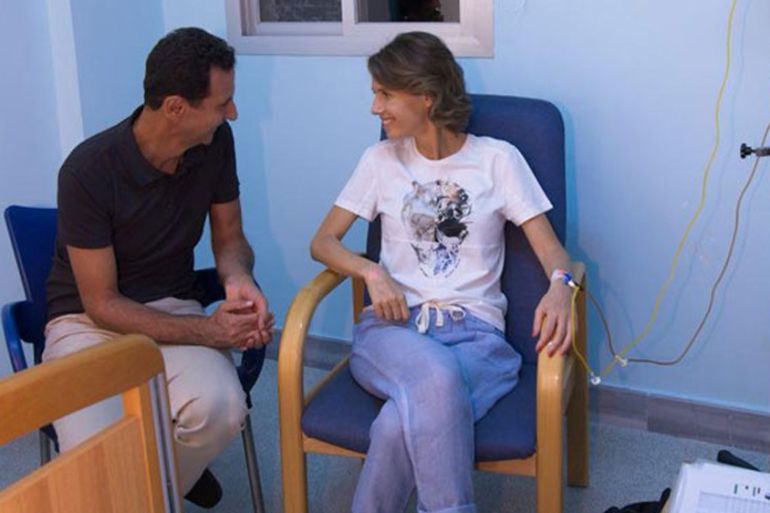Bashar al-Assad’s wife being treated for breast cancer
Asma al-Assad undergoing treatment for a malignant tumour, the Syrian government said on its social media accounts.

Asma al-Assad, the wife of Syrian President Bashar al-Assad, began treatment for early stage breast cancer as the government released an image of her with an intravenous drip inserted in her left hand on its social media accounts.
“Asma al-Assad is beginning the first stage of treatment for a malignant tumour in the breast that was discovered at an early stage,” the president’s office said on its Facebook page.
Keep reading
list of 4 itemsThe Take: Thirteen years later, has the world forgotten Syria?
Jordan army kills drug runners at Syria border amid soaring Captagon trade
Assad arrest warrant: ‘Hope and pain’ for Syrian chemical attack survivors
The announcement came with a photo of the first lady smiling at her husband who sat to her right.
The office did not specify where the first lady was being treated, but the word “military” was printed on a blanket visible in the picture, indicating she was likely in a military hospital.
Born in 1975, the British-born former investment banker had been styled as a progressive rights advocate before Syria’s war began in March 2011.
She was the subject of flattering profiles in Vogue and other fashion magazines, but as the conflict worsened, the first lady became a target of contempt from many opposition supporters who saw her as whitewashing atrocities carried out by the government.
In recent years, photos of Asma socialising with residents of Syria’s capital, Damascus, were regularly posted to several social media platforms, including an official Instagram account.
The centre of Damascus, where the family is believed to live, has been spared much of the violence that has swept the country. Just a few kilometres away, suburbs and towns have been reduced to rubble after incessant barrel bombing and air raids.
The conflict, which has killed at least 400,000 people and forced at least 11 million people to flee their homes, began in March 2011 as a protest movement against Assad’s government.
It quickly degenerated into a proxy war, with neighbouring countries and international powers backing different sides.
According to Save the Children, more than 650,000 people are currently trapped in besieged areas, and millions need food, water and medical care.